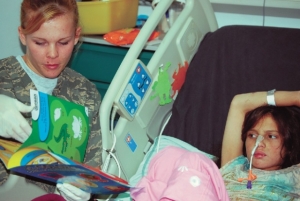Innocence nearly lost
By Kenneth Fine
Published in News on July 5, 2009 9:11 AM

Photo courtesy of Air Force Reserve Maj. Shannon Mann
Senior Airman Kristen Babicki, in her first week at Bagram Air Base, Afghanistan, reads to the little girl nearly killed when a fight broke out between the Taliban and Coalition forces near her home.
EDITOR'S NOTE: The names of the Afghan nationals in this story have been changed. The family was afraid that if it became common knowledge that they had spoken with the media or had sought help in an American base hospital, they would be targeted and killed.
BAGRAM AIR BASE, Afghanistan -- Alia didn't put herself in the fight.
She is only 7 years old.
But that didn't stop an explosion from nearly making her another casualty of Operation Enduring Freedom.
She was playing on the roof of her home in Afghanistan's Norstan province when a firefight broke out.
Moments later her father, Mahmoud, found her.
He thought about taking her to Kabul -- a trip that would have taken more than a day.
But luckily for that little girl, he stopped at a Coalition Forward Operating Base instead.
"She would have died," said Capt. Tina Raven-Kingson, one of the nurses now treating Alia at the Craig Joint Theater Hospital at Bagram Air Base. "She would have bled out and died."
Instead, the girl is now being read to every day by one volunteer while another brushes her hair.
She even managed a smile last week when Senior Airman Kristen Babicki showed her a sheet of Elmo stickers.
The hospital at Bagram was established as the last stop for Coalition troops before they are transported to the nearest hospital by medical evacuation teams.
But staff there would tell you that lately, Afghan nationals occupy many of the beds inside the facility.
Like the amputee with burns all over his face in a room down the hall from Alia -- and another with both legs blown off by a rocket-propelled grenade.
"I believe he's still in a coma," said Lt. Col. Elizabeth Coddington, the Intensive Care Unit flight commander. "We've had some sad cases here."
Many inside the clinic feel the humanitarian nature of Allied forces is lost in the mainstream media.
Mahmoud knows it exists.
"The bad thing about the fighting between the Coalition and Taliban is that innocent people are dying," he said through a Dari-to-English translator. "But if the Americans go, the whole country would be destroyed."
Stuffed animals, books and other items mean the world to the youngest victims of the war in Afghanistan.
And for the last several months, members of Seymour Johnson Air Force Base's own 336th Fighter Squadron -- and their family members -- have made sure they never want for them.
"All of the Americans are so humanitarian and kind," Mahmoud said. "They have good behavior with us."
"We try to make sure they have stuff to take with them when they go home," added 336th Tech. Sgt. Danielle Holloway, one of the 100 volunteers who grace the hospital halls at Bagram. "Whatever we can do, we do."
But the squadron is supporting America's fighting force just as fiercely -- with care packages complete with hygiene products, clothing and food.
And that support is certainly needed, as wounded troops are flown in daily via helicopters.
"A lot of times they come here and we have to cut their clothes off," Mrs. Coddington said. "They are either covered in blood or ripped up."
*
The hospital at Bagram is as close to state-of-the-art as you will find in a war theater.
It can house up to six patients in the trauma bay, has two operating rooms and employs many different kinds of doctors -- an orthopedic surgeon, general surgeon and a combat stress team complete with a psychologist and psychologist to deal with Post Traumatic Stress Disorder.
The only thing it lacks is an MRI.
The facility is manned by a joint force of Army and Air Force personnel and volunteers.
The average stay for Coalition troops injured on the battlefield is two days, at which point they are taken aboard a medical evacuation mission bound for Ramstein Air Force Base, Germany's Landstuhl Medical facility.
Afghan nationals are admitted on a case-by-case basis, depending on whether or not they pose a threat to the base.
Even some who do are treated there -- albeit under the watch of American guards.
*
There was no question about whether or not to treat Alia.
Even after her father confessed that the Taliban tried to intimidate his family.
"They kept telling her to say she was hurt by the Americans," her father said.
"If she had, they would have given the family money," Mrs. Coddington added.
Despite all she has been through over the past two weeks, Alia is going to be fine, the doctors say.
But until the Taliban is defeated, her father fears she will never be able to play like a little girl should.
"We just want the fighting to stop," he said. "We want the Taliban to be defeated so we can live our lives."
